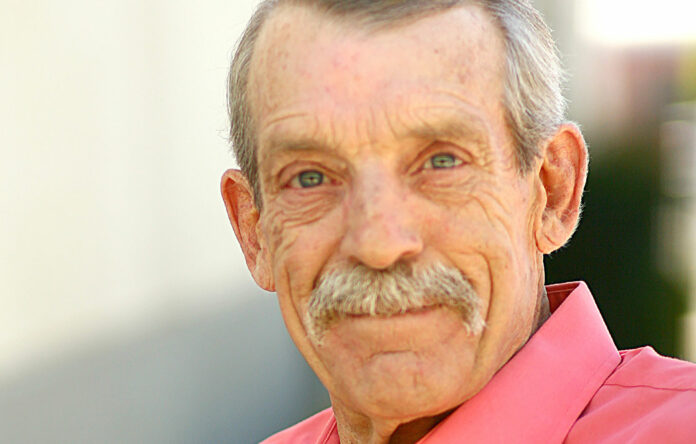I remember when the wall speaker above Mr. Spears desk made that squawking, scratchy noise it made just before a voice came over and said “Mr. Spears, please send Steve Wilson to the office.” Great, now what?
The “office” was of course the office of the vice-principal, a man with the last name of Huckleberry; I’m not kidding, Huckleberry. At that time the only other time we heard that name was on Saturday morning cartoons when we watched “The Huckleberry Hound Show” (which had such characters as Yogi Bear and Boo-Boo Bear, Hokey Wolf and the mice Pixie and Dixie with the cat Mr. Jinks, all of whom had voices imitating such movie stars as Marlon Brando, Phil Silvers and . . . but I digress).
At any rate I got up from my desk and made my way to the office all the time wondering why I was called. Getting called to the office usually meant some sort of misconduct was going to be discussed (and possibly punished), but in this case I was pretty sure I was on safe ground because my name was the only name called. It was when three or four names came squawking out of those infernal classroom speakers that one knew there was surely a speech on behavior coming, and possibly swats from a paddle; corporal punishment was in place back in those days and if one’s actions went far enough beyond acceptability then one could get a warmed backside. But on this day, it was my name alone that was heard by my classmates, no Rivera or Williamson or Johansen, just Wilson, and of course the classroom reaction was a collective “Oooh,” the common response when any student was called to the office.
But on this day, I wasn’t being called for correction of some errant behavior but instead was asked to do something for the town. I was asked to recite a poem at the two town cemeteries on Memorial Day. Wow! I wasn’t expecting that, but I eagerly agreed and was given a copy of “In Flanders Fields,” a poem written during World War One by a Canadian soldier. Flanders Fields is a cemetery in France where many fallen American, British and Canadian warriors are buried, and the poppies that grow there are reddish in color and became an international symbol of remembrance, the American Legion’s Poppy Day a prime example.
I remember that Memorial Day vividly, as well as the following year when in the eighth grade I repeated my performance at both cemeteries. Back then, in the late ’60s, the American Legion had a seven-man color guard, which fired three times in succession, the traditional Twenty-One Gun Salute, and we lads would quickly scamper about to collect the expended brass for souvenirs, though I doubt any of us left from those days has one of those keepsakes today. Graduation from Greenfield Elementary School marked the end of my poetic recitations on Memorial Day for over four decades.
I had recited the poem once or twice sometime in the early 2000s after graduation from university in 2003, but it was not until 2014 that I have annually recited “In Flanders Fields” and read the names of the service personnel interned in Holy Trinity Cemetery and Greenfield Cemetery, and I consider it an honor to be able to do so. But I feel it is time to let someone younger take on that solemnity and stand before those gathered on that special day.
With that, I offer the following open letter to interested parties at middle school and high school levels:
TO: Administrators, faculty and students of Greenfield High School, Vista Verde Middle School and all other students sixth through 12th grade levels
FROM: Steve Wilson
RE: Students needed for participation in Greenfield Memorial Day observances
Dear All;
For the past nine years it has been my privilege and honor to be involved in the local remembrances at the city’s two cemeteries on Memorial Day; this participation consisting of the recitation of the poem “In Flanders Fields” and the reading of the names of American service personnel interned at each cemetery.
I was 12 and 13 years old when I first recited the poem in public and now at the age of 70 years, I think the time has come to let younger persons take on this remembrance segment of the day.
Ideally, three people, two reciters and one horn player, would fulfill the complement. This allows one to recite the poem, a three-stanza rhyme of under 100 words, one to read the names and the playing of TAPS.
While I cannot cite nor even guess the number of sixth through 12th grade students living in Greenfield and Arroyo Seco, I can confidently say there are enough to fill a three-person bill, so all they need is encouragement. That is where the adults come into the equation.
Any administrator or parent or person with positive influence on the scores of young people who could participate in this tradition are asked to seek out those individuals that want to volunteer and encourage those who have the desire but lack the confidence; a lacking easily overcome.
All interested persons should contact Carlos Venegas through American Legion Post 635, (831) 236-2521 or P.O. Box 635. It would be unfortunate to let this segment of the Memorial Day observance die out due to lack of participation.
Sincerely,
Steve Wilson
***
Given the amount of information online, I am sure I could do a short research and find explanations for words and phrases that pique my interest and will no doubt someday result to such measures; but until then I ponder the origin of the term “knucklehead.” It is one of those words if you say it out loud a few times it can’t help but make you laugh, and if you laugh out loud people will indeed think you are what you are laughing at.
Take care. Peace.














